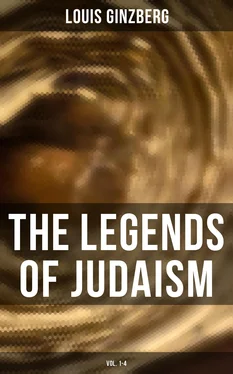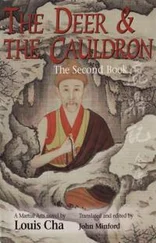Louis Ginzberg - The Legends of Judaism (Vol. 1-4)
Здесь есть возможность читать онлайн «Louis Ginzberg - The Legends of Judaism (Vol. 1-4)» — ознакомительный отрывок электронной книги совершенно бесплатно, а после прочтения отрывка купить полную версию. В некоторых случаях можно слушать аудио, скачать через торрент в формате fb2 и присутствует краткое содержание. Жанр: unrecognised, на английском языке. Описание произведения, (предисловие) а так же отзывы посетителей доступны на портале библиотеки ЛибКат.
- Название:The Legends of Judaism (Vol. 1-4)
- Автор:
- Жанр:
- Год:неизвестен
- ISBN:нет данных
- Рейтинг книги:5 / 5. Голосов: 1
-
Избранное:Добавить в избранное
- Отзывы:
-
Ваша оценка:
- 100
- 1
- 2
- 3
- 4
- 5
The Legends of Judaism (Vol. 1-4): краткое содержание, описание и аннотация
Предлагаем к чтению аннотацию, описание, краткое содержание или предисловие (зависит от того, что написал сам автор книги «The Legends of Judaism (Vol. 1-4)»). Если вы не нашли необходимую информацию о книге — напишите в комментариях, мы постараемся отыскать её.
The Legends of Judaism (Vol. 1-4) — читать онлайн ознакомительный отрывок
Ниже представлен текст книги, разбитый по страницам. Система сохранения места последней прочитанной страницы, позволяет с удобством читать онлайн бесплатно книгу «The Legends of Judaism (Vol. 1-4)», без необходимости каждый раз заново искать на чём Вы остановились. Поставьте закладку, и сможете в любой момент перейти на страницу, на которой закончили чтение.
Интервал:
Закладка:
Accordingly, the whole of creation was conditional. God said to the things He made on the first six days: "If Israel accepts the Torah, you will continue and endure; otherwise, I shall turn everything back into chaos again." The whole world was thus kept in suspense and dread until the day of the revelation on Sinai, when Israel received and accepted the Torah, and so fulfilled the condition made by God at the time when He created the universe.
THE ANGELS AND THE CREATION OF MAN
God in His wisdom hiving resolved to create man, He asked counsel of all around Him before He proceeded to execute His purpose—an example to man, be he never so great and distinguished, not to scorn the advice of the humble and lowly. First God called upon heaven and earth, then upon all other things He had created, and last upon the angels.
The angels were not all of one opinion. The Angel of Love favored the creation of man, because he would be affectionate and loving; but the Angel of Truth opposed it, because he would be full of lies. And while the Angel of Justice favored it, because he would practice justice, the Angel of Peace opposed it, because he would be quarrelsome.
To invalidate his protest, God cast the Angel of Truth down from heaven to earth, and when the others cried out against such contemptuous treatment of their companion, He said, "Truth will spring back out of the earth."
The objections of the angels would have been much stronger, had they known the whole truth about man. God had told them only about the pious, and had concealed from them that there would be reprobates among mankind, too. And yet, though they knew but half the truth, the angels were nevertheless prompted to cry out: "What is man, that Thou art mindful of him? And the son of man, that Thou visitest him?" God replied: "The fowl of the air and the fish of the sea, what were they created for? Of what avail a larder full of appetizing dainties, and no guest to enjoy them?" And the angels could not but exclaim: "O Lord, our Lord, how excellent is Thy name in all the earth! Do as is pleasing in Thy sight."
For not a few of the angels their opposition bore fatal consequences. When God summoned the band under the archangel Michael, and asked their opinion on the creation of man, they answered scornfully: "What is man, that Thou art mindful of him? And the son of man, that Thou visitest him?" God thereupon stretched forth His little finger, and all were consumed by fire except their chief Michael. And the same fate befell the band under the leadership of the archangel Gabriel; he alone of all was saved from destruction.
The third band consulted was commanded by the archangel Labbiel. Taught by the horrible fate of his predecessors, he warned his troop: "You have seen what misfortune overtook the angels who said 'What is man, that Thou art mindful of him?' Let us have a care not to do likewise, lest we suffer the same dire punishment. For God will not refrain from doing in the end what He has planned. Therefore it is advisable for us to yield to His wishes." Thus warned, the angels spoke: "Lord of the world, it is well that Thou hast thought of creating man. Do Thou create him according to Thy will. And as for us, we will be his attendants and his ministers, and reveal unto him all our secrets." Thereupon God changed Labbiel's name to Raphael, the Rescuer, because his host of angels had been rescued by his sage advice. He was appointed the Angel of Healing, who has in his safe-keeping all the celestial remedies, the types of the medical remedies used on earth.
THE CREATION OF ADAM
When at last the assent of the angels to the creation of man was given, God said to Gabriel: "Go and fetch Me dust from the four corners of the earth, and I will create man therewith." Gabriel went forth to do the bidding of the Lord, but the earth drove him away, and refused to let him gather up dust from it. Gabriel remonstrated: "Why, O Earth, dost thou not hearken unto the voice of the Lord, who founded thee upon the waters without props or pillars?" The earth replied, and said: "I am destined to become a curse, and to be cursed through man, and if God Himself does not take the dust from me, no one else shall ever do it." When God heard this, He stretched out His hand, took of the dust of the ground, and created the first man therewith. Of set purpose the dust was taken from all four corners of the earth, so that if a man from the east should happen to die in the west, or a man from the west in the east, the earth should not dare refuse to receive the dead, and tell him to go whence he was taken. Wherever a man chances to die, and wheresoever he is buried, there will he return to the earth from which he sprang. Also, the dust was of various colors—red, black, white, and green—red for the blood, black for the bowels, white for the bones and veins, and green for the pale skin.
At this early moment the Torah interfered. She addressed herself to God: "O Lord of the world! The world is Thine, Thou canst do with it as seemeth good in Thine eyes. But the man Thou art now creating will be few of days and full of trouble and sin. If it be not Thy purpose to have forbearance and patience with him, it were better not to call him into being." God replied, "Is it for naught I am called long-suffering and merciful?"
The grace and lovingkindness of God revealed themselves particularly in His taking one spoonful of dust from the spot where in time to come the altar would stand, saying, "I shall take man from the place of atonement, that he may endure."
THE SOUL OF MAN
The care which God exercised in fashioning every detail of the body of man is as naught in comparison with His solicitude for the human soul. The soul of man was created on the first day, for it is the spirit of God moving upon the face of the waters. Thus, instead of being the last, man is really the first work of creation.
This spirit, or, to call it by its usual name, the soul of man, possesses five different powers. By means of one of them she escapes from the body every night, rises up to heaven, and fetches new life thence for man.
With the soul of Adam the souls of all the generations of men were created. They are stored up in a promptuary, in the seventh of the heavens, whence they are drawn as they are needed for human body after human body.
The soul and body of man are united in this way: When a woman has conceived, the Angel of the Night, Lailah, carries the sperm before God, and God decrees what manner of human being shall become of it—whether it shall be male or female, strong or weak, rich or poor, beautiful or ugly, long or short, fat or thin, and what all its other qualities shall be. Piety and wickedness alone are left to the determination of man himself. Then God makes a sign to the angel appointed over the souls, saying, "Bring Me the soul so-and-so, which is hidden in Paradise, whose name is so-and-so, and whose form is so-and-so." The angel brings the designated soul, and she bows down when she appears in the presence of God, and prostrates herself before Him. At that moment, God issues the command, "Enter this sperm." The soul opens her mouth, and pleads: "O Lord of the world! I am well pleased with the world in which I have been living since the day on which Thou didst call me into being. Why dost Thou now desire to have me enter this impure sperm, I who am holy and pure, and a part of Thy glory?" God consoles her: "The world which I shall cause thee to enter is better than the world in which thou hast lived hitherto, and when I created thee, it was only for this purpose." The soul is then forced to enter the sperm against her will, and the angel carries her back to the womb of the mother. Two angels are detailed to watch that she shall not leave it, nor drop out of it, and a light is set above her, whereby the soul can see from one end of the world to the other. In the morning an angel carries her to Paradise, and shows her the righteous, who sit there in their glory, with crowns upon their heads. The angel then says to the soul, "Dost thou know who these are?" She replies in the negative, and the angel goes on: "These whom thou beholdest here were formed, like unto thee, in the womb of their mother. When they came into the world, they observed God's Torah and His commandments. Therefore they became the partakers of this bliss which thou seest them enjoy. Know, also thou wilt one day depart from the world below, and if thou wilt observe God's Torah, then wilt thou be found worthy of sitting with these pious ones. But if not, thou wilt be doomed to the other place."
Читать дальшеИнтервал:
Закладка:
Похожие книги на «The Legends of Judaism (Vol. 1-4)»
Представляем Вашему вниманию похожие книги на «The Legends of Judaism (Vol. 1-4)» списком для выбора. Мы отобрали схожую по названию и смыслу литературу в надежде предоставить читателям больше вариантов отыскать новые, интересные, ещё непрочитанные произведения.
Обсуждение, отзывы о книге «The Legends of Judaism (Vol. 1-4)» и просто собственные мнения читателей. Оставьте ваши комментарии, напишите, что Вы думаете о произведении, его смысле или главных героях. Укажите что конкретно понравилось, а что нет, и почему Вы так считаете.












